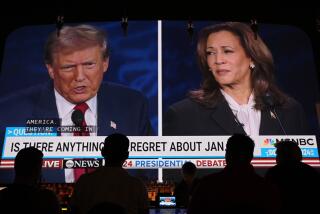Facial Expressions: Windows to Emotions That Can Betray Liars
- Share via
Many people think the eyes are the window to man’s soul.
Paul Ekman says eyes are also the windows to lies--as are the mouth, the curve of the eyebrows, the eyelids and other combinations of the 44 muscles in the face.
For more than 30 years, Ekman, a professor of psychology at the University of California, San Francisco, has studied nonverbal communication, including lies and how the face betrays the liar.
The face actually shows not the fact of lying but the emotions surrounding the lie.
Can Detect Embarrassment
“Lies can be detected through emotions one has about lying,” Ekman said. “For example, if lying makes a person uncomfortable and embarrassed, one can detect the embarrassment through facial reactions.”
Ekman became involved in studying facial expressions through research on emotions in 13 countries. He found that facial expressions for happiness, fear, anger, disgust, sadness and distress are the same for all people.
The study of lies and of lie detection is relatively new.
Many factors influence the liar’s expression: how the person feels about lying, the degree of possible punishment, anger and distress. Anger would cause a thinning of the lips; fear or terror would cause the eyebrows to raise together, upper eyelids to rise and lower eyelids to tense.
Some expressions are only fleeting and can only be noticed by a trained observer.
Ekman said that in the case of a pathological or natural liar, detection is that much harder because the liar believes his story.
Listener a Key
Whether a liar will get away with his story also depends on the listener.
“The person hearing the lie may be vulnerable and cooperate with the liar by hearing what he wants to hear,” Ekman said.
“There are two ways of being taken in. One is to believe the liar, the other is to disbelieve the truthful person.”
Although there are many factors in lie detection, Ekman said he thinks the ability to read expressions would be helpful to the U.S. government.
“After Chernobyl, the outside would have been better able to assess (Soviet leader Mikhail S.) Gorbachev’s emotional state and, therefore, the truth of the seriousness of the situation,” he said.
“The Soviets are training agents in the detection of facial expression,” said Ekman, who has lectured in Russia. “We are lagging behind the Soviet Union.”
Secret Service Workshops
Ekman also has given workshops to the Secret Service and seminars to a number of federal and state judges. He said both groups seem particularly adept at spotting liars.
Ekman said that his seminars, which last six to eight hours, make a marked difference in a person’s ability to spot liars but that they also show that people are more liable to err in judgment.
“Judges who have taken the course wind up less sure of their ability to spot a liar than before,” he said.
“But I think the person who really should be trained is the policeman who makes the arrests, because the criminal will not have had time to practice.”
He said it is possible for the criminal to practice his responses with his lawyer and during the trial. It is when a person has had no chance to practice, such as a husband or wife caught lying about a lover, that the person is likely to make an emotional error and slip.
Polygraphs Open to Error
Ekman said polygraphs also are open to some error. A response might be skewed, for example, if someone does something as simple as biting the tongue.
“The polygraph measures responses--respiration, heartbeat and skin response--not lies, but the emotional response,” he said.
“But if it’s used in a narrow context with a small group, in a criminal context,” Ekman said, “I think it provides 80%-90% accuracy.
“Three years ago, it was determined that the polygraph is giving more information than people are getting from it,” he said, adding that tests to determine lying should include not only polygraphs but also observation of facial expressions and voice tests, both of which reveal emotions.
Tests aside, Ekman acknowledges the occasional necessity for a lie. As he says in his book, “Telling Lies”:
“Consider what life would be like if everyone could lie perfectly or if no one could lie at all. . . . If we could never know how someone really felt, and if we knew that we couldn’t know, life would be more tenuous.
” . . . And if we could never lie, if a smile was reliable, never absent when pleasure was felt, and never present without pleasure, life would be rougher than it is, many relationships harder to maintain.”
More to Read
Sign up for Essential California
The most important California stories and recommendations in your inbox every morning.
You may occasionally receive promotional content from the Los Angeles Times.












